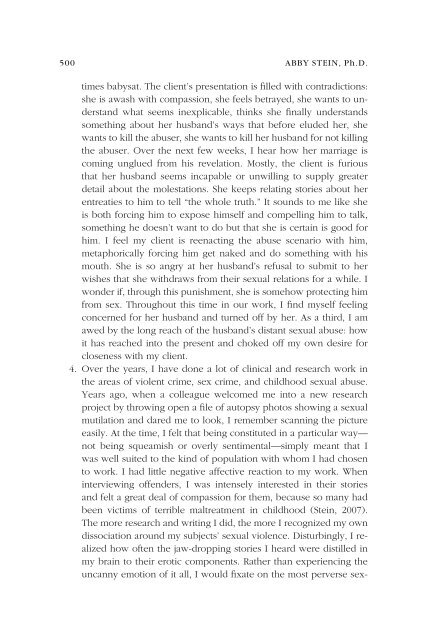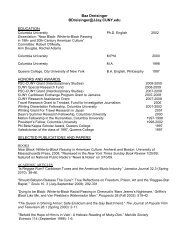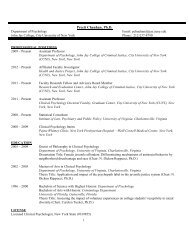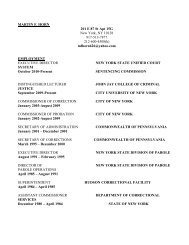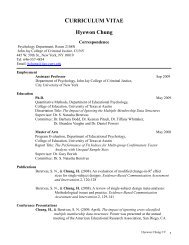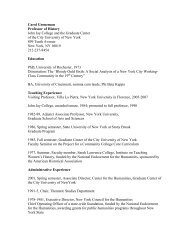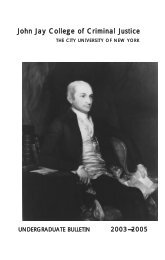The Sex MonSTer: - John Jay College Of Criminal Justice - CUNY
The Sex MonSTer: - John Jay College Of Criminal Justice - CUNY
The Sex MonSTer: - John Jay College Of Criminal Justice - CUNY
Create successful ePaper yourself
Turn your PDF publications into a flip-book with our unique Google optimized e-Paper software.
500 Abby stein, ph.d.<br />
times babysat. <strong>The</strong> client’s presentation is filled with contradictions:<br />
she is awash with compassion, she feels betrayed, she wants to understand<br />
what seems inexplicable, thinks she finally understands<br />
something about her husband’s ways that before eluded her, she<br />
wants to kill the abuser, she wants to kill her husband for not killing<br />
the abuser. Over the next few weeks, I hear how her marriage is<br />
coming unglued from his revelation. Mostly, the client is furious<br />
that her husband seems incapable or unwilling to supply greater<br />
detail about the molestations. She keeps relating stories about her<br />
entreaties to him to tell “the whole truth.” It sounds to me like she<br />
is both forcing him to expose himself and compelling him to talk,<br />
something he doesn’t want to do but that she is certain is good for<br />
him. I feel my client is reenacting the abuse scenario with him,<br />
metaphorically forcing him get naked and do something with his<br />
mouth. She is so angry at her husband’s refusal to submit to her<br />
wishes that she withdraws from their sexual relations for a while. I<br />
wonder if, through this punishment, she is somehow protecting him<br />
from sex. Throughout this time in our work, I find myself feeling<br />
concerned for her husband and turned off by her. As a third, I am<br />
awed by the long reach of the husband’s distant sexual abuse: how<br />
it has reached into the present and choked off my own desire for<br />
closeness with my client.<br />
4. Over the years, I have done a lot of clinical and research work in<br />
the areas of violent crime, sex crime, and childhood sexual abuse.<br />
Years ago, when a colleague welcomed me into a new research<br />
project by throwing open a file of autopsy photos showing a sexual<br />
mutilation and dared me to look, I remember scanning the picture<br />
easily. At the time, I felt that being constituted in a particular way—<br />
not being squeamish or overly sentimental—simply meant that I<br />
was well suited to the kind of population with whom I had chosen<br />
to work. I had little negative affective reaction to my work. When<br />
interviewing offenders, I was intensely interested in their stories<br />
and felt a great deal of compassion for them, because so many had<br />
been victims of terrible maltreatment in childhood (Stein, 2007).<br />
<strong>The</strong> more research and writing I did, the more I recognized my own<br />
dissociation around my subjects’ sexual violence. Disturbingly, I realized<br />
how often the jaw-dropping stories I heard were distilled in<br />
my brain to their erotic components. Rather than experiencing the<br />
uncanny emotion of it all, I would fixate on the most perverse sex-<br />
04 CP47(4) 497-518.indd 500 10/6/2011 11:16:33 AM


